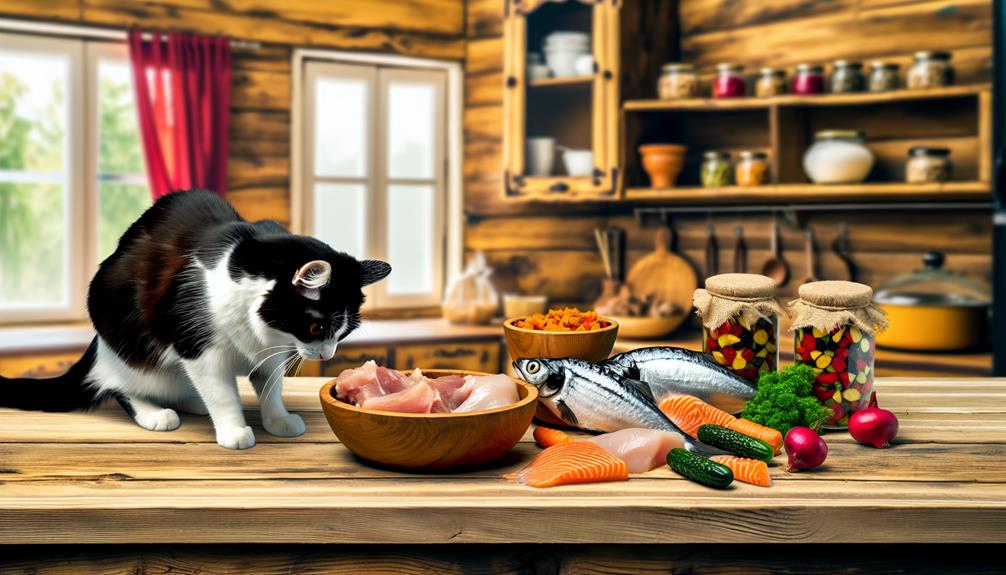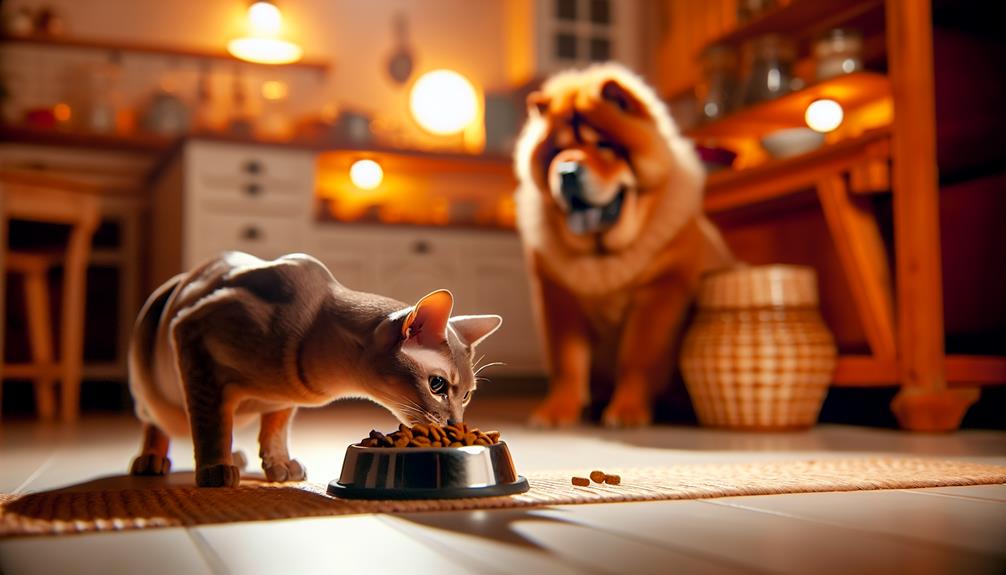Just as you wouldn't use a one-size-fits-all approach for different athletes' diets, the same principle applies to feeding cats and dogs. You might be wondering if it's okay for your cat to nibble on dog food occasionally. While it's not immediately harmful, the nutritional needs of cats are quite different from those of dogs. Cats are obligate carnivores and require specific nutrients that dog food simply can't provide in the right amounts. So, what exactly are the risks, and why is a cat's diet so specialized? Let's explore the significant differences.
Nutritional Differences Between Cats and Dogs
When considering the nutritional differences between cats and dogs, it's vital to understand that cats are obligate carnivores, meaning their diet must consist mainly of meat. This fundamental distinction has profound implications for their protein requirements and vitamin needs.
Cats require a higher percentage of their diet to be protein compared to dogs. Proteins are composed of amino acids, which are the building blocks for various physiological functions. Cats have a unique requirement for an amino acid called taurine, which is found mainly in animal tissue. Unlike dogs, cats cannot synthesize sufficient taurine on their own, necessitating a diet rich in high-quality animal proteins to prevent deficiencies and associated health issues such as retinal degeneration and cardiomyopathy.
In terms of vitamin needs, cats also have unique requirements that differ markedly from those of dogs. One such example is Vitamin A. Dogs can convert beta-carotene from plant sources into active Vitamin A, but cats lack this ability. As a result, they require preformed Vitamin A, which is found in animal tissues. Additionally, Vitamin D is another vital nutrient where cats' needs are distinct. While dogs can derive Vitamin D from sunlight exposure, cats must obtain it directly from their diet, making it imperative for their food to contain adequate levels of this vitamin.
Understanding these core nutritional differences underscores why cat food formulations are specifically tailored to meet the stringent dietary needs of felines. Feeding a cat dog food, which is not designed to meet these unique protein requirements and vitamin needs, can lead to severe nutritional deficiencies and health complications over time. It's important to provide your cat with a diet that aligns with its obligate carnivorous nature.
Why Cats Need Specific Nutrients
Given the unique dietary requirements of felines, it is important to understand why cats need specific nutrients. Cats are obligate carnivores, meaning their diet must mainly consist of meat to meet their physiological needs. This is in stark contrast to dogs, which are omnivores. The feline diet must include certain important nutrients that support their unique metabolic pathways and physiological processes.
One key nutrient is taurine, an amino acid found exclusively in animal tissues. Unlike dogs, cats cannot synthesize sufficient taurine on their own and therefore rely on dietary intake to prevent deficiencies that can lead to severe health issues, such as dilated cardiomyopathy and retinal degeneration. Additionally, arachidonic acid, an important fatty acid, is another significant component. Cats cannot convert linoleic acid to arachidonic acid efficiently, necessitating its presence in their diet for proper skin and coat health, as well as reproductive function.
Vitamin A is another essential nutrient. While dogs can convert beta-carotene from plant sources into active vitamin A, cats lack this capability and must obtain preformed vitamin A directly from animal tissues. Similarly, vitamin B3 (niacin) is critical; cats must acquire it from their food because they can't convert tryptophan into niacin efficiently.
Protein requirements are also notably higher in cats. Their liver enzymes are perpetually active in protein metabolism, necessitating a diet rich in high-quality animal proteins to maintain muscle mass, skin integrity, and overall health.
Understanding these important nutrients is imperative for formulating a balanced and appropriate feline diet. Each nutrient plays a pivotal role in maintaining the health and well-being of your cat, thereby underscoring why a feline-specific diet is necessary.
Potential Health Risks for Cats

Understanding the specific nutrients cats require is foundational to recognizing the potential health risks associated with feeding them dog food. Cats are obligate carnivores, necessitating a diet rich in animal proteins and specific amino acids like taurine, which are not present in sufficient quantities in dog food. Feeding your cat dog food can lead to significant nutrient deficiencies, causing various clinical complications.
One of the immediate concerns is digestive issues. Dog food is formulated with a different macronutrient balance, often higher in carbohydrates and fiber than what cats can comfortably digest. This mismatch can result in gastrointestinal disturbances such as vomiting, diarrhea, and bloating. Prolonged consumption exacerbates these symptoms, potentially leading to chronic digestive disorders.
The long term effects of an inadequate diet are even more alarming. A deficiency in taurine, an essential amino acid, can result in severe conditions such as dilated cardiomyopathy (DCM) and central retinal degeneration, both of which can be life-threatening. Additionally, insufficient levels of arachidonic acid, another crucial nutrient, can impair inflammatory responses and skin health.
Moreover, dog food typically lacks the appropriate levels of vitamin A and B-complex vitamins required for a cat's metabolic processes. Over time, this can lead to a myriad of health issues including lethargy, poor coat quality, and significant weight loss. The absence of proper dietary fats can also disrupt energy levels and overall growth, especially in kittens.
Occasional Consumption: Is It Safe?
Occasional consumption of dog food by cats may not immediately result in severe health issues, but it's far from ideal. While a single instance of your cat nibbling on dog food is unlikely to cause acute harm, consistent or repeated episodes of occasional feeding can lead to significant dietary imbalances.
Cats are obligate carnivores, requiring a diet rich in specific nutrients such as taurine, arachidonic acid, and certain vitamins like Vitamin A and B12, which are naturally found in animal tissues. Dog food, on the other hand, is formulated for omnivorous canines and is typically deficient in these essential nutrients. Even though dog food contains proteins and fats, the dietary impact on cats can be profound over time. A lack of taurine, for instance, can lead to taurine deficiency, resulting in serious conditions like dilated cardiomyopathy and retinal degeneration.
Moreover, dog food often includes higher levels of carbohydrates and plant-based ingredients, which are not suitable for a cat's digestive system. This can result in gastrointestinal disturbances such as diarrhea, vomiting, or even long-term issues like obesity and diabetes. Additionally, the imbalance in vitamins and minerals could compromise your cat's immune system and overall health.
It's essential to understand that even if your cat seems to enjoy the occasional feeding of dog food, this doesn't mean it's safe or beneficial. Regularly monitoring your cat's diet and ensuring it meets all nutritional requirements is imperative for their well-being. If your cat has consumed dog food accidentally, observe them for any signs of distress and consult your veterinarian for guidance on mitigating any potential dietary impact.
Alternatives to Dog Food for Cats

When considering dietary alternatives to dog food for cats, it is crucial to prioritize options that meet their unique nutritional requirements as obligate carnivores. Unlike dogs, cats need high levels of animal protein, taurine, and specific vitamins and minerals to maintain peak health. Feeding them dog food, which is designed for omnivores, may result in nutrient deficiencies.
Commercial cat food alternatives are widely available and specifically formulated to meet feline dietary needs. These products guarantee your cat receives appropriate levels of protein, fats, and vital nutrients. Always look for high-quality brands that list meat as the first ingredient.
Nutrient Comparison: Cat Food vs. Dog Food vs. Homemade Diets
| Nutrient | Commercial Cat Food | Dog Food | Homemade Cat Diets |
|---|---|---|---|
| Protein | High (30-45%) | Moderate (18-26%) | Customizable |
| Taurine | Vital | Lacking | Must be added |
| Vitamin A | Adequate | Often insufficient | Needs supplementation |
Homemade cat diets can be a viable option if prepared correctly. However, creating a balanced homemade diet requires precise formulation and a deep understanding of feline nutrition. Consult with a veterinary nutritionist to confirm your homemade cat diet includes all vital nutrients. Common ingredients in homemade diets include raw or cooked meats, organs, and a mix of supplements to provide necessary vitamins and minerals.
Conclusion
So, can cats eat dog food? While an occasional nibble won't cause immediate harm, it's not suitable for their long-term health due to critical nutritional differences. Cats, as obligate carnivores, need specific nutrients like taurine and arachidonic acid, which dog food lacks. Over time, these deficiencies could lead to severe health issues. Isn't it better to guarantee your feline friend's diet is precisely formulated for their unique needs? Stick to cat food to maintain their ideal health.
